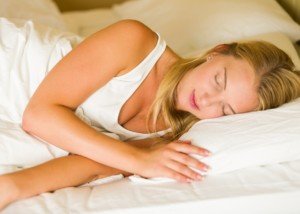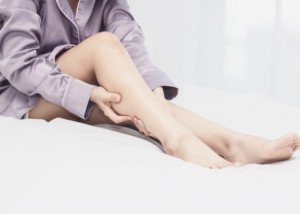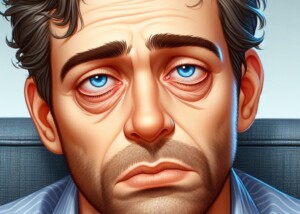
Just WHAT is going on when you’re full of energy straight through the late evening but then wake up dog tired after eight hours of sleep?
Perhaps the following has happened to you many times: All day long you’re full of energy, feeling great, and even right up to the last minute before bedtime, you still feel like you have a lot of productivity left in you, but it’s time to go to bed because you want eight hours of sleep.
You sleep soundfully; the alarm goes off after eight hours, and doggone, you feel like you’ve had only four hours of sleep, and feel like you can sleep another four hours—easily.
But you absolutely must get up to begin the new day, and furthermore, you keep reading that getting more than nine hours of sleep is associated with health ailments—even exceeding eight hours has been linked to medical problems. So you drag yourself out of bed.
Strangely, within 10 minutes, you’re beginning to feel quite awake, and you accomplish another very productive day.
Even when you’ve had seven or even six hours of sleep (having to get up early for an appointment), you feel energized throughout the day and evening and never experience drowsiness or the need for even a single catnap.
Now let’s assume you don’t ingest much caffeine, if at all. You work out and are very physically fit.

Freepik.com
And you don’t have sleep apnea (a person with sleep apnea will feel drowsy throughout the day and want to take naps).
“A person could wake dead tired for a number of reasons,” begins Kathryn Boling, MD, a board certified family medicine practitioner with Mercy Medical Center in Baltimore, MD.
“Drinking alcohol at night can interfere with sleep and cause a person to awaken tired the next day, even if they think they slept soundly,” continues Dr. Boling. But what if you don’t drink?
“Exercising too late in the evening can also interfere with sleep – as it acts as a stimulant,” she continues.
- But what if your exercise routine was earlier in the day?
- Or what if it was one of your light-day workouts? Why does eight hours of sleep feel like only four?
Why do you feel your body needs at least two more hours of sleep, and your eyes are so heavy and groggy, as you lie there in bed, dreading having to get up for the day?
Why aren’t you one of those people who have no problem exiting their bed the moment they awaken—those enviable individuals who’ve told you that if they stay in bed once they awaken, they won’t be able to fall back asleep?
Dr. Boling offers more explanations: “Eating a heavy meal late at night can also interfere with sleep and make a person feel sluggish the next morning.” But you don’t eat heavy meals late at night, right?
“Keeping the room too warm at night might cause restless sleeping and cause a person to awaken feeling dead tired.”
And what if your room’s temperature is kept at a steady 72, and what if you’ve tried other temperatures, and you continue to feel dead tired in the morning?
“We make melatonin once the sun goes down to help us sleep at the correct time and keep our circadian clock functioning properly – it’s a chemical produced primarily in the pineal gland,” says Dr. Boling.
“Exposure to a computer or TV at night reduces melatonin production as well as stimulates a nerve pathway from the eye to parts of the brain that control hormones, body temperature and other functions that could influence the quality of sleep.”
Try to get all of your eight hours of sleep between 10 pm and 6 pm.
Yes, I know that’s utterly impossible for some people, but logistically quite feasible for others. Or shoot for 11 pm to 7 am, or midnight to 8 pm as the third option.
But the later you push bedtime back, the more you’ll throw off your circadian rhythm.
Could it be psychological?
Psychological explanation should be strongly considered. Do you feel dead tired after eight hours of sleep on the first day of your vacation at the ski resort or at the tropical island?
In fact, I’m betting that on the first day of your much-anticipated vacation in Las Vegas, Spain or with beloved extended family members only a few hundred miles away, you jumped out of bed after only five hours of sleep, as wide awake as if you’d already been up for a few hours. No need for an alarm clock.
After five or six hours you naturally awakened and were minus that awful grogginess and heavy eyes, unable to drift back into slumber.
You threw off the covers and instead of dragging yourself around, excitedly bounced about as you got ready for the day.
It’s also possible that you may not actually be asleep for as much time as you think.
Does it take a long time to fall asleep because you keep reflecting upon all of your problems or tasks for the next day?
Do you wait until mornings to organize your day and figure out what needs to be done? The anticipation of this can cause trouble falling asleep.
So even though you were in bed for eight hours, you were asleep for only five; hence, why you feel dog tired in the morning.

Dr. Boling diagnoses and treats a wide range of conditions from acute illnesses to chronic diseases such as diabetes and hypertension, and has 20 years’ experience with Mercy Medical Center-Baltimore.
 Lorra Garrick has been covering medical, fitness and cybersecurity topics for many years, having written thousands of articles for print magazines and websites, including as a ghostwriter. She’s also a former ACE-certified personal trainer.
Lorra Garrick has been covering medical, fitness and cybersecurity topics for many years, having written thousands of articles for print magazines and websites, including as a ghostwriter. She’s also a former ACE-certified personal trainer.
.


























